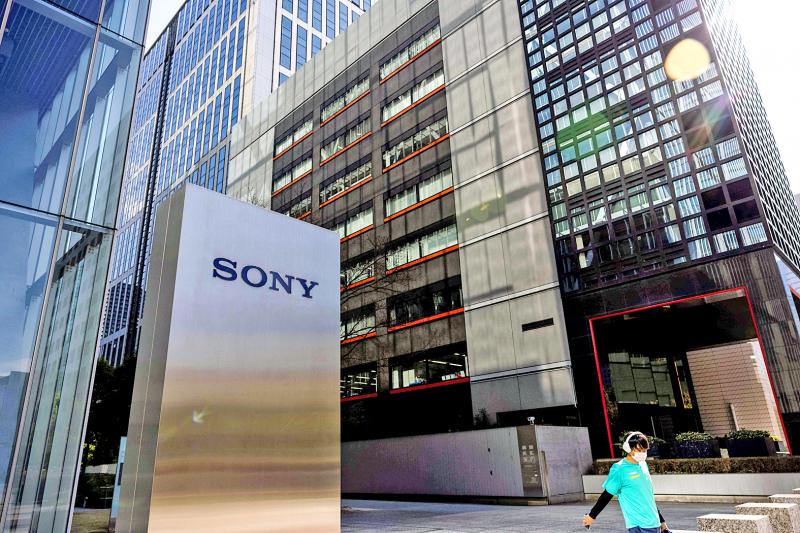Sony Group Corp upgraded its full-year net profit forecast on Wednesday, buoyed by the success of its latest Spider-Man movie and strong results in the gaming sector despite the global chip shortage.
The Japanese tech giant already logged a record net profit in 2020-2021, with a pandemic boom in gaming swelling its profits.
Although the huge demand for gaming is tapering as virus restrictions are eased in many countries, Sony said it is continuing to see a strong performance across sectors including film, gaming and electronics.

Photo: AFP
The conglomerate now projects a net profit of ¥860 billion (US$7.4 billion) for the fiscal year to March this year, having already hiked its full-year estimate to ¥730 billion in the previous quarter.
“Operating income is expected to be higher than the October forecast due to expected increases in operating income in the pictures, game and network services, electronic products and solution and music segments,” Sony said in a statement.
A favorable foreign exchange rate and expected decrease in operating losses in other sectors including its corporate division will also boost its bottom line, it said.
Sony expects higher sales in its film division, “primarily due to an expected increase in sales ... resulting from the strong theatrical performances of Spider-Man: No Way Home and Venom: Let There Be Carnage,” it said.
No Way Home, released in December in the US, became the first billion-dollar-grossing film of the pandemic era over the Christmas weekend, according to industry watcher Exhibitor Relations.
Sony expects the global chip shortage to hit sales of its PlayStation 5 console this financial year, but said operating income in its gaming sector would still be higher than previously forecast “due to an expected decrease in selling, general and administrative expenses.”
The company has faced challenges rolling out the PS5, which is regularly sold out and remains hard for consumers to get hold of in part due to global supply chain disruption.
The forecast comes as Sony finds itself in a battle for gaming supremacy after US rival Microsoft Corp snapped up Call of Duty maker Activision Blizzard Inc in a landmark US$69 billion deal.
Sony hit back with its own acquisition announcement this week, unveiling a US$3.6 billion agreement to buy US video game studio Bungie, creator of hits such as Halo and Destiny.
Net profit in the nine months to December last year was ¥771 billion, down 20 percent year-on-year, Sony said, with sales in the same period up 13 percent to ¥7.66 trillion.

RECYCLE: Taiwan would aid manufacturers in refining rare earths from discarded appliances, which would fit the nation’s circular economy goals, minister Kung said Taiwan would work with the US and Japan on a proposed cooperation initiative in response to Beijing’s newly announced rare earth export curbs, Minister of Economic Affairs Kung Ming-hsin (龔明鑫) said yesterday. China last week announced new restrictions requiring companies to obtain export licenses if their products contain more than 0.1 percent of Chinese-origin rare earths by value. US Secretary of the Treasury Scott Bessent on Wednesday responded by saying that Beijing was “unreliable” in its rare earths exports, adding that the US would “neither be commanded, nor controlled” by China, several media outlets reported. Japanese Minister of Finance Katsunobu Kato yesterday also

Taiwan’s rapidly aging population is fueling a sharp increase in homes occupied solely by elderly people, a trend that is reshaping the nation’s housing market and social fabric, real-estate brokers said yesterday. About 850,000 residences were occupied by elderly people in the first quarter, including 655,000 that housed only one resident, the Ministry of the Interior said. The figures have nearly doubled from a decade earlier, Great Home Realty Co (大家房屋) said, as people aged 65 and older now make up 20.8 percent of the population. “The so-called silver tsunami represents more than just a demographic shift — it could fundamentally redefine the

China Airlines Ltd (CAL, 中華航空) said it expects peak season effects in the fourth quarter to continue to boost demand for passenger flights and cargo services, after reporting its second-highest-ever September sales on Monday. The carrier said it posted NT$15.88 billion (US$517 million) in consolidated sales last month, trailing only September last year’s NT$16.01 billion. Last month, CAL generated NT$8.77 billion from its passenger flights and NT$5.37 billion from cargo services, it said. In the first nine months of this year, the carrier posted NT$154.93 billion in cumulative sales, up 2.62 percent from a year earlier, marking the second-highest level for the January-September

Businesses across the global semiconductor supply chain are bracing themselves for disruptions from an escalating trade war, after China imposed curbs on rare earth mineral exports and the US responded with additional tariffs and restrictions on software sales to the Asian nation. China’s restrictions, the most targeted move yet to limit supplies of rare earth materials, represent the first major attempt by Beijing to exercise long-arm jurisdiction over foreign companies to target the semiconductor industry, threatening to stall the chips powering the artificial intelligence (AI) boom. They prompted US President Donald Trump on Friday to announce that he would impose an additional